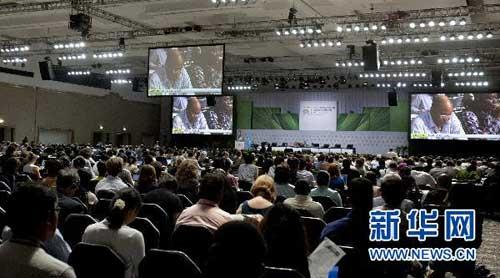Cancun climate talks expected to provide answers to some key issues
|
Delegates from nearly 200 countries are gathering in Mexico's Cancun, for talks on climate change. [Photo: Xinhua] |
Delegates from nearly 200 countries are gathering in Mexico's Cancun, for talks on climate change.
The latest meeting is expected to provide answers to some key issues, and act as a stepping-stone to achieving broader agreement next year.
Michelle Begue, Cancun, Mexico, said, "Thousands of participants from Government agencies, non governmental organizations, business and research institutions from more than 190 countries are giving their input on how to stop climate change."
The Kyoto Protocol, the only legally binding international law on capping green house gas emissions, is set to expire in 2012.Several key players from the convention have come out saying they do not expect a binding deal to replace it this year. However, the belief is Cancun can provide an opportunity for international negotiators to progress on smaller key issues.
Agastya Muthama, NGO, said, "After the massive collapse of COP 15 Copenhagen, COP 16 should be more of a stepping stone to COP 17 in south africa and for that to happen they have to lay down a couple of basic steps at the LCA and KP tracks, that is the long term cooperation and the Kyoto Protocol tracks, on things that they can actually achieve this time that I think are very important."
One of those key issues, that was advanced at last years Climate Change Conference, was the REDD initiative.The program provides incentives to developing countries who take actions to reduce deforestation.Japan, a co-chair of the initiative, explains the challenges arise when putting together a helpful action plan for such varied regions.
Hiroki Miyazono, Japan Int'l Cooperation Agency, said, "Asia is normally more densely populated region compared to other regions in Latin America and Africa there are a lot of people living near the forest or in the forest and the forest is a very important source of income for the people."
The Conflicts become more evident as nations with completely different development and energy needs are forced agree on one solid global treaty that works for everyone.Some feel achievements can come more easily when similar countries unite with a plan to battle their needs on a global stage.
Agastya Muthama, NGO, said, The thing is, every country is so different especially when you are looking at an area as big as Asia. Every country has its own goals, its own growth patterns. Right now we just walked out of the Japanese side event and they have been working on a bilateral transfer of REDD money. They have been doing things like giving projects to small reforestation in Indonesia or Brazil.But we need that on an international level and a framework for that."
The solution proposed by Japanese negotiators with REDD is to combine initiatives at the international, national and grass roots levels.
Hiroki Miyazono, Japan Int'l Cooperation Agency, said, "We have to go both ways with a global cooperation and a regional cooperation. Because there is no one fit for all of these."
The delegates are all united in their belief that something needs to be done to help the environment.The question is: to what scale and through what programs? The expectation is that Cancun provides the answers to these smaller issues, thus setting an important stepping-stone in achieving a broader international agreement on climate change next year.
 0
0 








Go to Forum >>0 Comments